|
Page < 1 2 3 4 5 6 7 8 9 10 11 12 13 14 15 16 17 18 19 20 21 22 23 24 >
Indology
and the British
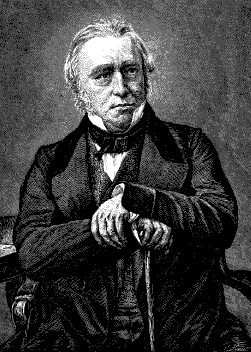 Lord
Thomas Babbington Macaulay (1800-59) was the first Law Member of
the Governor-General's Legislature and is best known for introducing English
education in India. Speaking in the British Parliament, he said on February 2,
1835 the following: Lord
Thomas Babbington Macaulay (1800-59) was the first Law Member of
the Governor-General's Legislature and is best known for introducing English
education in India. Speaking in the British Parliament, he said on February 2,
1835 the following:
“Such
wealth I have seen in this country (India), such high moral values, people of
such caliber, that I do not think we would ever conquer this country unless we
break the very backbone of this nation, which (backbone) is her spiritual and
cultural heritage. And therefore, I propose that we replace her old and ancient
education system, her culture, for if the Indians think that all that is foreign
and English is good and greater than their own, they will lose their
self-esteem, their native self-culture and they will become what we want them, a
truly dominated nation”.
For more
refer to chapter on
First
Indologists
and
Aryan
Invasion Theory.
***
The
belief of European Christians that other races were inferior, led to
colonisation and large scale abuse. The extirpation of native peoples in the
Americas
, in
Australasia
, and elsewhere around the world was of little consequence since these peoples
were only pagans and might not even possess souls. They were slaves by nature. God had
made them like that. Christian scholars and pseudo-scientists concurred. Sample
non-Christians were kept in western Human
zoos - Racist
theme parks for
Europe
’s colonists
in the nineteenth century. There was an Australian aborigine in London
Zoo.
A
Congolese pygmy named Ota
Benga (1881- 1916) shared a cage with an
orang-utan in the Bronx Zoo
as late as 1906 .
Colonisation by European powers was
seen as a God given opportunity for spreading the gospel to the heathen. It was
a Christian duty, even when it led to the deaths of millions. God encouraged
colonisation. He showed the way. He spoke to churchmen. He cleared the path for
colonialists. His Churches were keen to convert or replace native heathen
populations. Both
Catholic and
Protestant
Churches
encouraged colonialism. Typically, in
Africa
, missionaries would advance into new territories. Sooner or later they would
sow discord, encouraging rebellion against unsympathetic local rulers. When
bloodshed followed the Churches would appeal to European governments to
intervene, and another territory would be annexed. This process seems to have
accounted for more than half of the European colonies in
Africa
.
Churches were often guilty of
complicity in massacres and atrocities resulting from colonial policy. For
example King
Leopold was granted control of the
Congo
in 1885 explicitly to bring Christianity to the benighted heathen. The
atrocities perpetrated by his government in the
Belgian Congo
- the extensive use of slave labour and assorted murderous practices - were
first concealed, then minimised by the Roman Church.
Colonization
was regarded by almost all Christians as wholly good, divinely sanctioned and
necessary, well into the twentieth century.
(source:
Christianity,
Apartheid and Racialism - heretication.info).
***
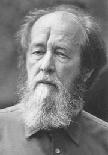 Aleksandr
Solzhenitsyn (1981 - )
Russian author and historian, who was awarded the Nobel Prize for Literature in
1970. In his work Solzhenitsyn continued the realistic tradition of Dostoevsky
and Tolstoy and complemented it later with his views of the flaws of both East
and West. Aleksandr
Solzhenitsyn (1981 - )
Russian author and historian, who was awarded the Nobel Prize for Literature in
1970. In his work Solzhenitsyn continued the realistic tradition of Dostoevsky
and Tolstoy and complemented it later with his views of the flaws of both East
and West.
He once put it:
"The mistake of the West is
that it measures other civilizations by the degree to which they approximate to
Western civilization. If they do not approximate it, they are hopeless, dumb,
reactionary."
(source: Aleksandr Solzhenitsyn,
interviewed in Time of 24 July 1989). Refer to The
parade of the vanquished and
On
A Neglected Aspect Of Western Racism – By
Kurt Jonassohn.
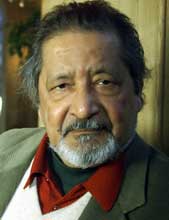 V
S Naipaul 1932
- ) Nobel laureate, He
is the author of several books including Beyond
Belief: Islamic Excursions Among the Converted Peoples,
Among
the Believers: An Islamic Journey, and India:
A Wounded Civilization. V
S Naipaul 1932
- ) Nobel laureate, He
is the author of several books including Beyond
Belief: Islamic Excursions Among the Converted Peoples,
Among
the Believers: An Islamic Journey, and India:
A Wounded Civilization.
In
his masterly travelogue, Among the Believers –
An Islamic Journey, shares his
intimate insight into the ways an alien religion
destroyed indigenous cultures.
“Because I was
soon to discover that no colonization had been so thorough as the colonization
that had come with the Arab faith. Colonized or defeated peoples can begin to
distrust themselves. In the Muslim countries I am talking about, this distrust
had all the force of religion. It was an article of the Arab faith that
everything before the faith was wrong, misguided, heretical; there was no room
in the heart or mind of these believers for their pre-Mohammedan past. So ideas
of history here were quite different from ideas of history elsewhere; there was
no wish here to go back as far as possible into the past and to learn as much as
possible about the past."
“Now, traveling
among non-Arab Muslims, I found myself among a colonized
people who had been stripped by their faith of all that expanding intellectual
life, all the varied life of the mind and
senses, the expanding cultural and historical knowledge of the world, that I had
been growing into on the other side of the world. I was among people whose
identity was more or less contained in the faith. I was among people who wished
to be pure ... No colonization could have been greater than this colonization by
the faith.”
Naipaul describes
the effects well. Christianity
and Islam
are just two sides of the same intolerant coin.
(source: Beware
of wolves in sheep’s clothing
- By Sesha
Samarajiwa - Asian Tribune October
9, 2007).
Refer to
Stolen
Kingdom: An American Conspiracy
- By Budnick,
Rich (1992).
Honolulu
: Aloha Press.Refer
to Loot:
in search of the East India Company - By
Nick Robins and
How
India became poor - indiarealist.com.
Watch
An
Invasion through Conversion
- youtube.com
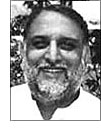 Vishal
Mangalwadi is
a Indian
Christian Missionary in his book, The
Grand Experiment, absurdly and comically asserts: Vishal
Mangalwadi is
a Indian
Christian Missionary in his book, The
Grand Experiment, absurdly and comically asserts:
"India's independence was actually the fruit produced by the 'Gospel of Jesus
Christ'".
He continues, "The transformation of India
into a free and modern nation was a grand experiment that was envisioned and
carried out by leaders who were driven by a biblical
world view".
I sincerely doubt that Mahatma
Gandhi was driven by a Christian world view!
(source:
Vishal
Mangalwadi to whom Mr Williams refers is first and foremost a Christian
missionary - By Kowlasar Misir). Refer to chapter on Conversion.
Refer to The
Bible Unmasked
Refer to
Why Indians Should Reject St. Thomas And Christianity -
By Koenraad Elst
 Dilip K Chakrabarti in
his book Colonial Indology p. 68, has
remarked:
Dilip K Chakrabarti in
his book Colonial Indology p. 68, has
remarked:
"The study of Hinduism was
undertaken by the British for political control of the land and the conversion
of its people to Christianity."
 Dr.
Dipak Basu of Nagasaki
University in Japan has written: Dr.
Dipak Basu of Nagasaki
University in Japan has written:
"The
British historians glorify the Muslim rule in India
and dismiss the Hindu period as myths and fantasy. They dismiss the Marxian
analysis of the British oppression of
India. They emphasize the improvements in administration, construction of railroad,
universities, abolition of ‘Sati’ and ‘Thugis’ from India and ultimate
peaceful transfer of power to Gandhi-Nehru. In
that history, there was no freedom movement in
India
, no man made famines, no transfer of huge resources from
India
to
Britain, no destruction of Indian industries and agriculture by the British rule, but
only a very benign and benevolent British rule in
India.
History
according to the JNU or
AMU is not much
different."
(source: CPI(M)
and Karl Marx
- By Dipak Basu - indiacause.com).
Also refer to Basu.
Watch
Scientific
verification of Vedic knowledge
Watch Scientific
verification of Vedic knowledge
***
Reverend
Midgley John Jennings Christian
chaplain of Delhi
and founder of St Stephen's High School
in 1854 and who vowed to uproot the religions of India:
"The
roots of ancient religions have here, as in all old places, struck deep and men
must be able to fathom deep in order to uproot them." The Christian
crusader saw the British empire as "the mysterious sway of God’s
Providence
" to convert heathen India.
Jennings
believed that in return for the Koh-i-noor diamond that had belonged to the
Mughal dynasty, the British should "give in return that "pearl of
great price" (Christianity).
"As the course of our Empire is so marvelously taking its course from the
East of India towards its West, so should the British be preparing to conquer
the subcontinent for Anglicanism and the one true God."
 The great divide between Indians and the
increasingly insular British grew under the Victorian Puritanism of the East
India Company in the 1840s and 1850s. Herbert
Edwardes (1819 - 1868) Commissioner of
Peshawar, and founder of the Edwardes
College in Peshawar, believed that
Britain
’s empire was a god-given right: The great divide between Indians and the
increasingly insular British grew under the Victorian Puritanism of the East
India Company in the 1840s and 1850s. Herbert
Edwardes (1819 - 1868) Commissioner of
Peshawar, and founder of the Edwardes
College in Peshawar, believed that
Britain
’s empire was a god-given right:
"The Giver of Empires is indeed
God" and
Britain
was given the Empire because England
had made the greatest effort to preserve the Christian religion in its purest
apostolic form."
The Bible was read two or three times a week "in
Hindoostanee to large numbers of natives who were assembled in the compound to
hear him." The English Delhi Gazette described the Christian evangelists as
preaching in the religious wilderness of
India: "They have been daily preaching to the masses, but I should say without a
shadow of success, having to compete with the four great anti-Christian powers
– trade, crime, pleasure and idolatry – in all their most frantic
forms."
Nor were the Hindus spared the Christian
assault:
Jennings
tried to convert millions of Hindu pilgrims at the Hindu festival, the Kumbh
Mela, on the banks of the
Ganges
, openly denouncing their "Satanic paganism." He provoked the naga sadhus as well as Muslim mujahedeen. The East India Company became the
vehicle for converting
India
to Christianity: "The time appears to have come," wrote Edmunds, a
Company colleague of
Jennings
in Calcutta, "when earnest consideration should be given to the subject, whether or
not all men should embrace the same system of religion. Railways, steam vessels
and the electric telegraph are rapidly uniting all the nations of the earth …
The land is being leavened and Hinduism is being everywhere undermined. Great
will some day, in god’s appointed time, be the fall of it."
"Our missions, then in India,
is to do for other nations what we have done for our own. To
the Hindus we have to preach one God.."
Charles
Grant, the first director of the Company,
shamelessly bashed Hindus:
"It is hardly possible to conceive any
people more completely enchained than they [the Hindus] are by their
superstitions." He believed they were "universally and wholly corrupt
… depraved as they are blind, and wretched as they are depraved." The karma of the British empire, the crusaders
believed, was not just conquest but conversion: "Is
it not necessary to conclude that our Asiatic territories were given to us, not
merely that we might draw an annual profit from them, but that we might diffuse
among their inhabitants, long sunk in darkness, vice and misery, the light and
benign influences of Truth?"
(source: The
Great Patriotic Revolt II. Imperial Nostalgia and Cultural Genocide – By
Fatima Shahnaz - radianceweekly.com
and The
history of the Church Missionary Society: Its environment, its men and its work
- By Eugene Stock 1899 page 210).
The ideology of
the British empire: the concept of a civilizing mission, the triumph of
civilization over barbarism, ardently supported by the missionary organizations.
In reality, colonialist motives were mainly those of material profits. The
malaise of India was aggravated in full measure by the East India Company with
its indiscriminate exploitation, corruption, and bribery. It
is cruel irony of history that whilst two major revolutions - the French and the
American - upholding the human rights to liberty and equality were taking
place in the West, India was in the throes of losing her own freedom to Western
mercantile imperialism. The
British domination of India has been described as a "political and economic
misfortune." In 1937, a distinguished British civil servant, G. T.
Garratt,
declared that the period of Indo-British civilization had been most
disappointing, and "in some ways the most sterile in Indian history."
(source: India
and World Civilization - By
D. P. Singhal ASIN
0870131435 p. 198-277). Refer to Jesus
Christ: Artifice for Aggression - By Sita Ram Goel. For
more information refer to chapter on First
Indologists and
Aryan Invasion Theory).
Refer to QuickTime trailer and Part One of the
film The
God Awful Truth.
Refer
to Bush-sponsored
Evangelisation of
India
-I - By V Sundaram
Refer to Bush-sponsored
Evangelisation of
India
-II – By V Sundaram
Refer to Bush-sponsored
Evangelisation of
India
-III – By V Sundaram
According to Guy
Sorman: "It was here (India) that the West started to colonize
what was to become the Third World, a shameless process of systematic
exploitation without any moral or religious justifications. And it was here that
was raised for the first time the demand for decolonization: this revolution of
the mind shook the supremacy of Europe, and the arrogance of the Europeans.
(source: The
Genius of India
- By Guy Sorman ('Le Genie de l'Inde') ISBN 0333936000
p.156).
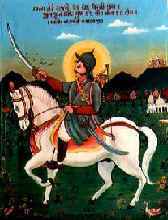 Hindus got some relief from this active religious
persecution when the British came. But they too had powerful missionary lobby of their own
whose aims were no different from the Portuguese missions. Though the missions were not
allowed to apply their usual strong arm methods, they were free to propagate their
religion. Their aim was conversion of heathens to the true faith, and to that end they
began to attack Hinduism in different ways. They attacked it for having too many Gods
while none of them was the right Biblical one. They attacked it for being idolatrous. They
attacked all its leading ideas --karma, incarnation, moksha, caste, compassion for all beings,
etc. Hindus got some relief from this active religious
persecution when the British came. But they too had powerful missionary lobby of their own
whose aims were no different from the Portuguese missions. Though the missions were not
allowed to apply their usual strong arm methods, they were free to propagate their
religion. Their aim was conversion of heathens to the true faith, and to that end they
began to attack Hinduism in different ways. They attacked it for having too many Gods
while none of them was the right Biblical one. They attacked it for being idolatrous. They
attacked all its leading ideas --karma, incarnation, moksha, caste, compassion for all beings,
etc.
The attack on the Hindu religion was supported by attack on
people and society. Hindu rites, customs, were all evil, and their morals and manners even
worse, if that were possible. They looked forward to a Christian India in a
not-too-distant future. In the beginning, it was hard to preach their doctrines in
India. Because India had a prosperous, evolved civilization, complete with a vast
recorded history, a comprehensive system of philosophy, art, science, and healthcare, and
humane methods for disseminating knowledge.
The tragic consequences
was that the convert now found himself cut off from his ancient roots, attached
to a foreign godhead and a foreign culture, and taught to despise and revile
everything that for millennia had been an object of worship for his ancestors -
including his own country. This proves how the so called "just and
merciful rule" of the British was indeed barbaric tyranny. The burning of
ancient books on Ayurveda in Kerala, so as to impose the European system of
medicine on the natives, the cutting of weavers' thumbs in Bengal with a view of
crippling the production of superior Indian cloth and ensuring the sale of
British products, the ruthless, often bloody, extortion of revenue from the
peasants for decades on end, even in the midst of the worst famines, the
whipping, hangings and tortures that awaited those who opposed the Empire -
these are only a few among the unending examples of the "providential
character" of the British rule. But they took place too far from the
"civilized" world to attract any notice. The Britons like the relief
of high-sounding speeches in London's salons, adorned with a few pagan objects
d'art purloined from India. )
(source:
Readings
in Vedic Literature: The Tradition Speaks for Itself - By Satsvarupa dasa
Goswami ISBN 0912776889 p. 173-181). For
more information refer to chapter on First
Indologists and
Aryan Invasion Theory).
History as a
Colonial Tool
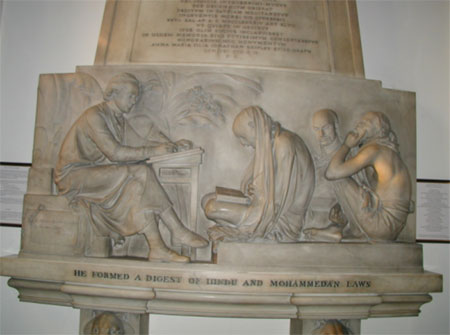
Sir William Jones with Brahmins
at his feet.
Sir William Jones (1746-1794)
the first British to master Sanskrit and study the Vedas, wrote to Sir
Warren Hastings how to spread "our pure faith" (Christianity) as "no mission
from the Church of Rome will ever be able to convert the Hindus."
Watch
Scientific
verification of Vedic knowledge. Watch
An
Invasion through Conversion
- youtube.com.
Watch
video - Brahmins
in
India
have become a minority. Refer to Be
wary of English translations of Hindu scriptures - By Sheena Patel
Refer to
Why Indians Should Reject St. Thomas And Christianity -
By Koenraad Elst
Refer to
Why Britain Failed to Subvert the Hindu Narrative – By Bhaskar Menon
***
Sir W. M.
Williams, a Sanskritist with great
missionary sympathies, prophesied,
"When the walls of the mighty fortress
of Brahminism are encircled, undermined and finally stormed by the soldiers of the Cross,
the victory of Christianity must be signal and complete."
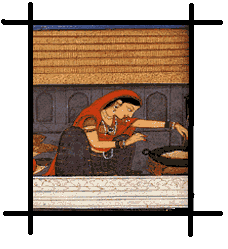 The colonial administrator was not unsympathetic to
the missionary attack. He knew that Hinduism was India's definition at its deepest
and also its principle of unity and regeneration and unless this principle was attacked,
India could not be successfully ruled. Hinduism also upheld India and its political
struggle. A people who had lost pride in themselves, and were demoralized, were welcome to
him. The colonial administrator was not unsympathetic to
the missionary attack. He knew that Hinduism was India's definition at its deepest
and also its principle of unity and regeneration and unless this principle was attacked,
India could not be successfully ruled. Hinduism also upheld India and its political
struggle. A people who had lost pride in themselves, and were demoralized, were welcome to
him.
Colonial scholars reinforced the missionary attack by
their own from another angle. They taught that India was not one country, that it was a
miscellany of people, that it had never known independence, that it had always been under
the rule of foreign invaders. This is where the Aryan Invasion Theory came into existence.
Their future native pupils learned their lesson well and even outdid their teachers. They
were to find in these invaders the main principle of their country's renewal and
civilization. To account for the common origin of Indo-European languages, several
nineteenth- century European scholars hypothesized that in ancient times an invasion of
India from Europe, by a people who spoke the original Indo-European language -- an
"Aryan" invasion--must have occurred.
Watch
Scientific
verification of Vedic knowledge.
(Refer to chapter on Aryan Invasion Theory).
Refer to
Jesus
Christ: Artifice for Aggression - By Sita Ram Goel.
Refer to
60 pc Britons' think Everest is UK's highest peak!
The Rich Ironies of the Aryan Invasion Theory
This is not to say that the British
did not succeed in taking control of the overall Indian narrative by
conceptualizing its history in communal terms and by outright fabrications such
as the “Aryan invasion theory” postulating an imaginary proto-European parent of
Indian civilization. But that was as much self-deception as it was manipulation.
In fact, the invention of the “Aryan Race” proved disastrous for Britain: it
became the basis for the racist ideology of Nazi
Germany and, in one of history’s rich ironies, mobilized under the
Swastika the armies that demolished its capacity to hold onto India.
(source:
Why Britain Failed to Subvert the Hindu Narrative – By Bhaskar Menon).
In typical Eurocentric
arrogance, they assumed,
without any evidence, that the Aryans came from outside India. Principal among these
"scholars" were Max Muller and Monier-Williams, both committed to denigrating
India's cultural heritage in order to persuade Indians to convert to Christianity.
In picking a date for the supposed Aryan
invasion of India by a supposed race of people, Rajaram writes: "Muller was strongly
influenced by a current Christian belief that the creation of the world had taken place at
9:00 a.m. on 23 October 4004 BC. Assuming the date of 4004 BC for the creation of the
world, as Muller did, leads to 2448 BC for the biblical Flood. If another thousand years
is allowed for the waters to subside and for the soil to get dry enough for the Aryans to
begin their invasion of India, we are left at around 1400 BC. Adding another two hundred
years before they could begin composing the Rig Veda brings us right to Muller's date of
1200.BC...he used a ghost story from Somadeva's Kathasaritasagara to support this
date."
 In a letter to his wife, Max Muller
wrote: In a letter to his wife, Max Muller
wrote:
"This edition of mine and the
translation of the Veda will hereafter tell to a great extent... the fate of India, and on
the growth of millions of souls in that country. It is the root of their religion, and to
show them what the root is, I feel sure, the only way of uprooting all that has sprung
from it during the last 3000 years."
Muller's
purpose was to uproot Hinduism. I would simply like to note that a lot of ideas have
become fixed because Max Mueller was a devout Christian, who believed existence started in
3760BC or so, as all devout Christians of his time (and ours, too) did and do. When
you have an authority who is so constrained by virtue of his dogma, assertions upon dating
of pre-historical matters become questionable.
The rulers had a clear motive, a clear goal. They
wanted an India which had no identity, no vision of its own, no native class of people
respected for their leadership. They were to be replaced as far as it lay in their power
by a new class of intellectuals. Meanwhile, the concerted attacks succeeded. They
were internalized, and we made them our own. There came a crop of "reformers"
who wanted India to change to the satisfaction of its critics. Above all, there appeared a
class of Hindu-hating Hindus who knew all the "bad things" about Hinduism.
Earlier invaders ruled through the sword.
The British ruled through Indology.
 "According
to European nationalism, other traditions and earlier ones were expressions of
mythological beliefs only: Christianity was an expression of historical fact.
" "According
to European nationalism, other traditions and earlier ones were expressions of
mythological beliefs only: Christianity was an expression of historical fact.
"
"To this day, the most threatening appositional phrase that
an avowed Christian can be presented with is 'Christian Mythology.' To accept
its validity is to shake the ground of her/his belief."
- Dr.
Marimba Ani - active organizer in the Afrikan Community.
Author of YURUGU:
An African-Centered Critique of European Cultural Thought and Behavior Africa
World Press. Sixth reprint 1996.p. 141. Refer
to Defaming
of Hinduism-I – By V Sundaram – newstodaynet.com and Defaming
of Hinduism-II – By V Sundaram – newstodaynet.com.
For
more on Christian Intolerance refer to
chapters on The Goa
Inquisition, Conversion,
and First Indologists.
Watch
Scientific
verification of Vedic knowledge
Prior to the nineteenth century, it was piously
believed in western civilization that the earth was created in seven days around 5,000
years ago. These ethnocentric blinders that some western thinkers unconsciously wear
before venturing into the past have resulted in the tunnel vision view of history as we
know it today. The western tradition of writing history may be traced to the
Judeo-Christian scriptures wherein one group of people writes about the people outside
that group. The Hindus do not think of time in linear terms with a beginning and an end.
Rather, they think in terms of great cycles of thousands and millions of years.
In conclusion, it can be said that ( the 19th century European
scholars) their work often reflects the bias of their times; the imperialism, materialism
and Christian missionary spirit, the tendency to look down upon Asia and its culture as
inferior, to even blame the spiritual traditions of Hinduism and Buddhism for the
political decline of these cultures.
Through
the Imperial Glass
The remarkable Tenacity of Imperial perceptions- The Lindsay Commission
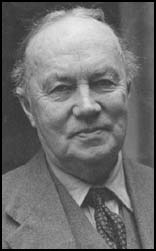 A
learned commission under Professor A D Lindsay, master
at
Ballicol
College,
Oxford, reported on Christian Education in
India
in 1931: A
learned commission under Professor A D Lindsay, master
at
Ballicol
College,
Oxford, reported on Christian Education in
India
in 1931:
It
maintained that although a ferment was in process within Hinduism, "Vedantic
philosophy still retained its control and moulded consciously or unconsciously
the fundamental attitudes of a vast majority of Hindus."
"The
ascendancy of a superficial secularism, typified in the Nehru plan for an Indian
constitution and in the personality of the Indian leader, Jawaharlal Nehru, the
Lindsay Commission declared, breathed new life into the spirit of easy
accommodation of a pantheistic attitude blurring distinctions between truth and
untruth and between right and wrong. With regard to the various efforts by
eminent Indians to recondition Hinduism, two superficial motives were discerned.
The first was the desire to give Hinduism a place in the modern world of
activity and competition and the other was to render it respectable before a
Western audience. Thus although the Gita with its call for action became a
breviary of inspiration to Bal Gangadhar Tilak,
Mohandas Karamchand Gandhi, Aurobindo Ghosh, Swami Vivekananda and Dayanand
Saraswati, the Lindsay Commission opined that the outcome was warped,
desultory and perfunctory.
The
Lindsay Commission, however, unanimously concluded that Vedanta, in that awkward
position, occupied ‘an uneasy seat’. The dominant figure in the Indian
landscape’, the Commission pronounced, ‘is still the Hindu ascetic and
sceptic sitting by the Jamuna’s bank watching the phantasmagoria of existence
with indifference mingled with contempt’. “
India
is too old to resent us’. There was a familiar ring in the exasperation.
‘Yet who can doubt that she will survive us? The secret of her permanence
lies, I think, in her passivity and power to assimilate. The faith that will not
fight cannot yield.”
"The
city of
Benares
was frequently upheld as representing the incongruity of this intriguing
development. Eternal
India
persisted there with more ardour and enthusiasm than anywhere else despite the
definite assault of Western science. The insolence and defiance of a
superstitious Hinduism amazed the learned Commission. Hinduism at
Benares
, the Lindsay Commission reported, still continued to unfold itself, unheeding a
Muslim emperor’s opposition, quite oblivious of the purifying and uplifting
efforts of the Buddhist monastery of a neighboring Sarnath and in sheer
indifference to the challenge of a Western and Christian civilization symbolized
by the steel bridge.” Christianity, and along with it, Western civilization,
the Lindsay Commission lamented, found Hinduism so firmly entrenched in the
Indian ethos that they could only touch it marginally. The future seemed
uncertain and this uncertainty released a feeling of melancholic frustration
which, in turn, reinforced the claims of righteousness and dressed imperialism
with a touch-me-not aloofness."
The
Lindsay Commission further stated on page 51 – 55:
“Secularism
is indeed the common enemy of all the religions since it demands in India, as it
does elsewhere, in the name of religion and progress, that religion shall be
rejected in a world where religion has no right…Hinduism
is far too deeply entrusted in the soul of India to be reckoned as defeated as
yet. As a matter of fact, the philosophy of Vedanta and the life of secularism
are perfectly natural allies. Both alike reject many of the values
that Christianity seeks to create and preserve, and with them, therefore,
Christianity can make no terms.”
The
imperial mind in utter bewilderment, was overwhelmed by a creepy feeling which
stood between it and Hinduism with its ‘ugly gods’, devastating ‘evil
eyes’ and ‘sure charms’ all shrouded in mysterious forces that were beyond
any rational explanation. It shivered at the infinite and immense secrets of
India.
(source:
The
Raj Syndrome: A Study in Imperial Perceptions - By Suhash Chakravarty
Penguin Books. 1991 p. 69 - 239).
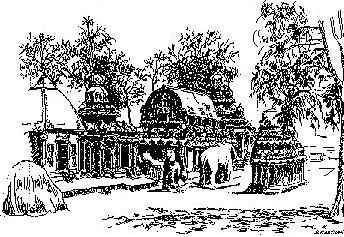 According
to author Paul William Roberts, According
to author Paul William Roberts,
"Conversion has largely failed in India because Christianity offers nothing
that is not already available somewhere in the many forms of Hinduism. Hinduism
never rejected the teachings of Jesus. Those who have converted either agreed
with a gun pressed at their skulls as in Goa, or because it provided an escape
from caste tyranny, as well as a guaranteed professional advancement. Through
its Vedic legacy, Hinduism respects all faiths. It clearly states that God is
one, but has many forms. The Christian message must sound preposterous: that God
is indeed one, but has only one recognized form, his son. The
"savages" of India were sophisticated - so sophisticated that the
imperialist mixture of church and state in Europe could not grasp such
sophistication."
"The
sheer power of Hinduism terrified the Christian soldiers."
"The British were more cunning at the game than the Portuguese, careful to show
respect for Indian religions. Yet they sneered at the pagans behind their back,
educated the Indian elite in British-run schools, or at Eton and Cambridge -
which, if it did not guarantee conversion to Christianity, resulted in lapsed
Hinduism, agnosticism, or an intellectual humanism.
In
India, Anglo indoctrination produced a generation of "brown sahibs"
who looked down on the religion of the masses, the opium of the people. Such is
the power of colonization that a whole generation must pass before the
paralyzing spell wears off."
(source: Empire
of the Soul: Some journeys in India - By Paul William Roberts ASIN
1573226351 p.
323-325). Refer to Jesus
Christ: Artifice for Aggression - By Sita Ram Goel
and Refer
to QuickTime trailer and Part One of the film The
God Awful Truth.
For
more information refer to chapter on First
Indologists and
Aryan Invasion Theory).
Dilip K Chakrabarti in
his book Colonial Indology p. 12, has
written:
"Western Orientalists took an
interest in Buddhism because they thought that its study would show that
Hinduism was not the only religion of India and thus weaken the position of
Hinduism. Secondly, by weakening the position of Hinduism this would also make
the task of propagating Christianity in India easier."
(Note:
Western scholars have tried to
portray Buddhism as an improvement over Hinduism. It
is as similar to portraying Christianity is
an improvement over Judaism). However,
Karma
and Nirvana are both Hindu concepts and Pali was born out of Sanskrit, just like
Italian came out of Latin).
Watch
Scientific
verification of Vedic knowledge. Refer
to Be
wary of English translations of Hindu scriptures - By Sheena Patel
William
Dalrymple, (1965 - ) author of The
Last Mughal, and award-winning travel writer and historian, has
recently written:
"By
1813, a change in the charter of the East India Company let loose a wave of
evangelical missionaries on
India
. The act was pushed through parliament by William
Wilberforce, who told MPs that "the natives of
India
, and more particularly the Brahmins, were sunk into the most abject ignorance
and vice".
The Rev
R Ainslie was typical of the new breed of missionaries filling
the cantonments, or military stations, of
India
during the 1830s. Ainslie wrote of his visit to Orissa: "I
have visited the
Valley
of
Death
! I have seen the Den of Darkness!" According to another outspoken evangelical, the Rev
Alexander Thompson: "Those
who between 1790 and 1820 held the highest offices in India, were on the whole
an irreligious body of men who approved of Hinduism much more than Christianity:
some who hated Missions from their dread of sedition; others because their
hearts 'seduced by fair idolatresses, had fallen to idols foul'."
(source:
Gods
and Monsters -
By William
Dalrymple - guardian.co.uk).
Refer to The
Bible Unmasked
William
Robinson,
missionary and author of By
Temple
Shrine
and Lotus Pool, wrote on p. 66 of his book:
"The fortress of caste
cannot be taken by external assault. Its wall will only crumble when the
garrison within ceases to repair them. The only real discipline that
India
has maintained is the discipline of caste. If you really could create genuine
democracy in
India
it would destroy caste. If it destroyed caste it would
destroy Hinduism and if it destroyed Hinduism it would destroy
India
, at least the
India
that has existed for so many thousand of years… Far, far better that they
remain good Hindus than become rampant atheists!"
(source: The
Raj Syndrome: A Study in Imperial Perceptions - By
Suhash Chakravarty p. 233).
(Note:
The British began to isolate the
North East regions of India in the name of 'protecting' the local indigenous people at the same time
converting them to Christianity). Refer to First
English Bible Fueled First Fundamentalists
- livescience.com
***
 Professor
Ashish Nandy
is a political psychologist, sociologist and director of Delhi's Center for the
Study of Developing Societies. He's also a versatile author, having written
books on post-colonialism, alternative sciences, psychology has also referred to
the colonized minds of present day Indians thus: Professor
Ashish Nandy
is a political psychologist, sociologist and director of Delhi's Center for the
Study of Developing Societies. He's also a versatile author, having written
books on post-colonialism, alternative sciences, psychology has also referred to
the colonized minds of present day Indians thus:
"The pressure to Westernize is the most
conspicuous form of this colonial mentality. Colonialism has a long way to go
before it is vanquished.! Our nation is ostensibly independent, but our minds
still remain enslaved..."
"The Indian press,
like most of its Third World counterparts, puts a premium on all that is modern and condemns
as degenerate all that is traditional...In order to put the stamp of legitimacy
on modernization, we have to believe that the traditional civilization was
inhuman."
"Instilling guilt about the "evils of Hindu
society" is indeed a favorite weapon of the secularist elite."
He further says, "First our
leaders were colonized and now they are post-colonized without ever having
been decolonized."
(source: Decolonizing the Hindu
Mind - Ideological Development of Hindu Revivalism
- By Koenraad Elst
ISBN 8171675190 p. 49 and The
Genius of India
- By Guy Sorman ('Le Genie de l'Inde') ISBN 0333936000 p.154). Watch
An
Invasion through Conversion
- youtube.com
Koenraad
Elst, author of Decolonizing the Hindu
Mind -
Ideological Development of Hindu Revivalism,
contends that the Hindu civilization is now in the process of coming out of a
thousand years of colonization— first by Islam and then Britain. This
is exactly the view of V. S. Naipaul
also who noted that the first step in this is for the Hindus to regain their
sense of history. This deloconization process is running into fierce resistance
from residual colonial interests on two fronts— the Islamists and the
‘secularists’.
(source:
Trenchant
Analysis of Hindu Revival and its Chanllenges - By N.S. Rajaram).
Consider
the view of a Christian missionary Vishal Mangalwadi, on India's quest for
freedom:
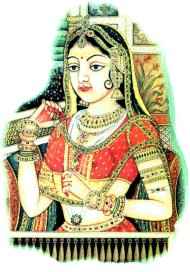 "Many
starry-eyed Indians, who are ignorant of Indian history, think that India was
free before the British colonized it. The fact is that Hindu India, never, I
repeat never, knew what freedom was, until the Evangelical movement began to set
us free...India's freedom is a fruit of the Christian
Gospel, not a result of Mahatma Gandhi's work." "Many
starry-eyed Indians, who are ignorant of Indian history, think that India was
free before the British colonized it. The fact is that Hindu India, never, I
repeat never, knew what freedom was, until the Evangelical movement began to set
us free...India's freedom is a fruit of the Christian
Gospel, not a result of Mahatma Gandhi's work."
(source: The
Quest For Freedom And Dignity - By Vishal Mangalwadi).
Sri
Sri Ravi Shankar, Founder of the
Bangalore based Art of Living, an International Foundation. He recently
addressed the UN Peace Summit on Aug 28. He is the only non-westerner to serve
on the advisory board of Yale University's School of Divinity and is author of
the book - Hinduism and Christianity. He
has said:
"Christians
are proud that they brought education to India, but it is not true: there were
for instance 125,000 medical institutes in Madras before the British came.
Indians never lacked education, the Christians only brought British education to
India, which in fact caused more damage to India by westernizing many of
us."
(source:
Arise
O' India - By Francois Gautier
ISBN 81-241-0518-9 p. 62). Watch
An
Invasion through Conversion - youtube.com.
Refer to
Be
wary of English translations of Hindu scriptures - By Sheena Patel
In
Vedic India, homosexuality is recognized as a separate and third nature (tritiya-prakriti).
Third-gender citizens were fully tolerated and incorporated into society. But during
the British Raj, homosexuality was considered a sin. Two years after
the 1857 rebellion, the British passed
the anti-sodomy law of 1860 is
enforced upon the entire empire that now includes India. The law, which
remarkably is still in place in India today as Section 377 of the Indian Penal
Code, reads: “Whoever voluntarily has carnal intercourse against the order of
nature with any man, woman or animal, shall be punished with imprisonment for
life, or with imprisonment of either description for a term which may extend to
ten years, and shall be liable to fine.” This law was
taken to be an improvement for Great Britain, which had previously punished
homosexuality by execution and torture, but for India it was a great step
backward since Hindu culture had never previously criminalized homosexuality.
The
British also enact legislation outlawing castration and cross-dressing in an
attempt to eliminate the eunuch class that had thrived under Islamic rule.
Despised by the British, eunuchs are forced into the darkest shadows of society
where they must now live as outcastes. Also during this
time, puritan scholars translate India’s Sanskrit texts into English, but they
omit or hide any reference to homosexuality because it is shocking to them.
By British estimation, India was a backward country
with a barbaric culture and primitive religion. The British Empire
would impress upon the Hindus their Christian values and educate them in proper,
civilized behavior while simultaneously exploiting their country’s resources
for another full century.
(source:
India’s
Slow Descent Into Homophobia - By Amara Das Wilhelm - galva.org).
For
more refer to chapter on thoughts
and Women in Hinduism.
For
more information refer to chapter on First
Indologists.
G. Beckerlegge
writes in
Culture and
Empire:
“Muller was a British agent, especially employed to write
the translations of the Vedas in such a demeaning way so that the Hindus should
lose faith in them.”
Colonial
Mischief: The De-Linking of Tribes in India by the British Empire
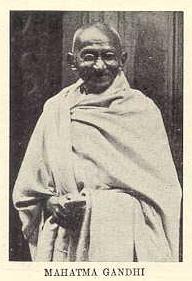 During
the freedom struggle, Mahatma
Gandhi and other nationalist leaders expressed
displeasure at the mischief perpetrated by colonial administrators among
backward and disadvantaged sections, and stoutly affirmed that tribals
constituted an inalienable part of Hindu society. During
the freedom struggle, Mahatma
Gandhi and other nationalist leaders expressed
displeasure at the mischief perpetrated by colonial administrators among
backward and disadvantaged sections, and stoutly affirmed that tribals
constituted an inalienable part of Hindu society.
Colonial
rhetoric not withstanding, tribals have never been
passive recipients of Hindu upper class (what Max Mueller labeled as
Brahamanical) cultural models, but have rather
contributed actively and enormously to the infinite variety of India’s
civilization from its primordial beginnings. The
colonial state insisted that Brahmins, peasants, untouchables and tribals were
separate groups with distinct customs and beliefs, and that Brahmins sought to
subjugate all others to establish their hegemony. Special attempts were made to
delink tribals from the main body of Hindu society through imposition of racial
categories and subterfuges in Census classifications.
Creating
a Division in Hindu Society
Animism - Disparaging terms to denote Nature Worship?
Colonial
anthropologists introduced a division in society by designating or
‘scheduling’ whole groups as tribes.
Disregarding centuries-old intimate
ties between caste Hindu and casteless tribal society, they classified the
tribals as ‘Animist’. Animism was another
disparaging term, used to denote
the worship of spirits and forces of nature as opposed to a ‘true’
(monotheistic) god.
This
bias persists in Western thought to this day, and rather than being debunked as
a phoney concept, animism is even now described as the belief that natural
phenomenon are endowed with ‘life’ or ‘spirit,’ and as the tendency to
attribute supernatural or spiritual characteristics to plants, geological
features, climatic phenomena and so on.
Little
wonder then that Mahatma
Gandhi bemoaned: “We were strangers to
this sort of classification – animists, aborigines, etc., but we have learnt
from the English rulers.” When the missionary Dr.
Chesterman queried if this objection applied to the ‘animist’
aboriginal races of the Kond hills, Gandhi insisted, “Yes,
it does apply, because I know that in spite of being described as animists these
tribes have from time immemorial been absorbed in Hinduism. They are, like the
indigenous medicine, of the soil, and their roots lie deep there.”
(source:
Adi
Deo Arya Devata – By Sandhya Jain
p. 2 - 235). Watch
Scientific
verification of Vedic knowledge.
For
more refer to chapter on
FirstIndologists
and Aryan
Invasion Theory and Conversion
and Nature
Worship. Also refer to Towards
Balkanisation, V: Adivasis - By Varsha Bhosle - rediff.com).
Refer to Jesus
Christ: Artifice for Aggression - By Sita Ram Goel
and Refer
to QuickTime trailer and Part One of the film The
God Awful Truth.
Watch
An
Invasion through Conversion
- youtube.com
  
Page < 1 2 3 4 5 6 7 8 9 10 11 12 13 14 15 16 17 18 19 20 21 22 23 24 >
|